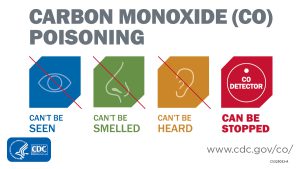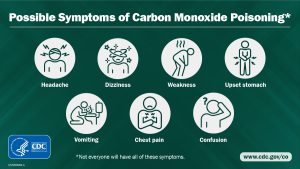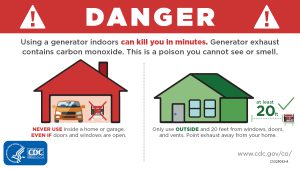Carbon Monoxide Poisoning Can be Deadly
Posted on by
It was the middle of winter, and a major snowstorm swept across several cities in the United States.* In Judy’s town, the power went out.
Judy was relieved that her household would still have electricity from a portable generator that she bought the week before. She set up the generator in her garage to protect it from the snow, but just a couple hours later, she started to feel dizzy, weak, and nauseous.
“It must just be the flu,” she thought. “It’s winter, and a lot of my friends have gotten sick lately.”
Judy continued with her normal activities, thinking everything was fine, but her symptoms became more serious. By the time her husband arrived home, he found her unconscious and rushed her to the emergency room.
At first, the doctor also thought Judy was experiencing the flu. But when Judy’s husband explained that he had found Judy near the garage with the generator, the doctor realized what had happened and treated Judy quickly. When she recovered, the doctor explained that she had experienced carbon monoxide (CO) poisoning, not the flu. Without urgent medical care, the situation could have been deadly.
“We should never use a portable generator indoors, including in an attached garage,” the doctor explained. “Keep your generator outdoors at least 20 feet away from your home and your neighbor’s home. Always make sure you have a working carbon monoxide detector.”
Although this is a fictional scenario, situations like Judy’s are common. Every year in the United States, at least 420 people die and more than 100,000 people visit the emergency department from accidental CO poisoning.
CO poisoning can happen anytime, but it often occurs when people use portable generators during power outages or when they heat their homes in unsafe ways. This winter, take some time to learn how you can stay safe from CO poisoning.
*Note: This vignette is a fictional account showing the risks of carbon monoxide poisoning.
What is CO poisoning?

CO is an odorless, colorless gas that is dangerous to humans and pets. Burning fuel in cars, generators, stoves, grills, lanterns, fireplaces, or furnaces produces CO, which can build up in enclosed spaces. Anyone, including your pets, can be at risk for CO poisoning, and CO poisoning can occur anytime.
Breathing in too much CO can cause you to pass out or can even be life-threatening. Other symptoms of CO poisoning include
- Headache
- Dizziness
- Weakness
- Upset stomach
- Vomiting
- Chest pain
- Confusion
Remember—many people mistake these symptoms for the flu. People who are sleeping or have been drinking alcohol may not even notice symptoms. It’s important to stay alert, know the symptoms of CO poisoning, and take precautions against CO exposure. If you suspect you have CO poisoning, go outdoors immediately and call 911.
How do I use a CO detector?
Keeping a working CO detector in your home is one of the most important ways to prevent CO poisoning. CO detectors sound an alarm to alert you of danger when CO levels are high.
Keep the following tips in mind:
- Use battery-powered or battery backup CO detectors, which work even if the power goes out.
- Put CO detectors near sleeping areas where they can wake you up if needed.
- Check or replace your CO detector’s battery regularly. Daylight savings is a great reminder to do this. You can change your batteries each spring and fall when you adjust your clocks.
- Replace your CO detector based on the manufacturer’s recommendations.
If your CO detector sounds an alarm, leave your house immediately and call 911.
What else can I do to prevent CO poisoning?
There are other steps you can take to prevent CO poisoning. If the power goes out and you need to use a portable generator, follow the manufacturer’s instructions. Use generators at least 20 feet away from any windows, doors, or vents.

The following tips can help you prevent CO poisoning in your home:
- Vent all gas appliances, and make sure vents aren’t blocked by debris.
- Don’t use ovens or gas ranges to heat your home.
- Never use generators, charcoal grills, camp stoves, or flameless chemical heaters indoors, even if windows are open.
- Have experts service gas appliances that are giving off unusual odors.
- Have a qualified technician service your heating system, water heater, and any gas, oil, or coal burning appliances every year.
- Only buy gas equipment that has the seal of a national testing agency, such as Underwriters’ Laboratories.
The following tips can help you prevent CO poisoning in your car:
- Have a mechanic check your car’s exhaust system every year.
- Make sure snow isn’t blocking your car’s exhaust pipe.
- Never leave vehicle motors running in your garage, even if the garage door is open.
- If driving a vehicle with a tailgate, open vents and windows when you open the tailgate to make sure air is moving through.
Additional Resources
- Quiz – How much do you know about carbon monoxide?
- Fact sheets on CO poisoning, generator safety, and furnace safety (available in 8 languages)
- Carbon monoxide public service announcements
- Frequently asked questions about CO poisoning
- Prevent carbon monoxide poisoning on your boat
Tweets
Tweet this: Carbon monoxide (CO) can be deadly. Install a working CO detector, vent all gas appliances, and use generators outdoors and at least 20 feet away from any door, window, or vent. Read the #CDCEHblog for more tips to prevent #COpoisoning: https://bit.ly/3YcbUIJ
Tweet this: #DYK? At least 420 people die and more than 100,000 people visit the emergency department from accidental carbon monoxide (CO) poisoning every year in the United States. Learn how to stay safe. Read the latest #CDCEHblog: https://bit.ly/3YcbUIJ


Post a Comment